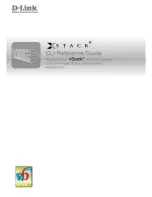
200
BigIron RX Series Configuration Guide
53-1001810-01
Configuring forwarding parameters
7
The first command configured an interface-based static route through Ethernet port 1/1. The
command assigns a metric of 1 to this route, causing the device to always prefer this route when it
is available. If the route becomes unavailable, the device uses an alternate route through the
next-hop gateway 192.168.8.11/24.
Configuring a default network route
The device enables you to specify a candidate default route without the need to specify the next
hop gateway. If the IP route table does not contain an explicit default route (for example, 0.0.0.0/0)
or propagate an explicit default route through routing protocols, the software can use the default
network route as a default route instead.
When the software uses the default network route, it also uses the default network route's next hop
gateway as the gateway of last resort.
This feature is especially useful in environments where network topology changes can make the
next hop gateway unreachable. This feature allows the device to perform default routing even if the
default network route's default gateway changes.
The feature thus differs from standard default routes. When you configure a standard default
route, you also specify the next hop gateway. If a topology change makes the gateway unreachable,
the default route becomes unusable.
For example, if you configure 10.10.10.0/24 as a candidate default network route, if the IP route
table does not contain an explicit default route (0.0.0.0/0), the software uses the default network
route and automatically uses that route's next hop gateway as the default gateway. If a topology
change occurs and as a result the default network route's next hop gateway changes, the software
can still use the default network route.
If you configure more than one default network route, the device uses the following algorithm to
select one of the routes.
1. Use the route with the lowest administrative distance.
2. If the administrative distances are equal:
•
Are the routes from different routing protocols (RIP, OSPF, or BGP4)? If so, use the route
with the lowest IP address.
•
If the routes are from the same routing protocol, use the route with the best metric. The
meaning of “best” metric depends on the routing protocol:
•
RIP – The metric is the number of hops (additional routers) to the destination. The best
route is the route with the fewest hops.
•
OSPF – The metric is the path cost associated with the route. The path cost does not
indicate the number of hops but is instead a numeric value associated with each route.
The best route is the route with the lowest path cost.
•
BGP4 – The metric is the Multi-exit Discriminator (MED) associated with the route. The
MED applies to routes that have multiple paths through the same AS. The best route is the
route with the lowest MED.
Summary of Contents for Brocade DCX
Page 40: ...xl BigIron RX Series Configuration Guide 53 1001810 01 ...
Page 72: ...lxxii BigIron RX Series Configuration Guide 53 1001810 01 ...
Page 88: ...16 BigIron RX Series Configuration Guide 53 1001810 01 Searching and filtering output 1 ...
Page 300: ...228 BigIron RX Series Configuration Guide 53 1001810 01 Displaying IP information 7 ...
Page 318: ...246 BigIron RX Series Configuration Guide 53 1001810 01 Deploying a LAG 8 ...
Page 418: ...346 BigIron RX Series Configuration Guide 53 1001810 01 SuperSpan 12 ...
Page 482: ...410 BigIron RX Series Configuration Guide 53 1001810 01 MRP CLI example 14 ...
Page 506: ...434 BigIron RX Series Configuration Guide 53 1001810 01 Displaying VSRP information 15 ...
Page 582: ...510 BigIron RX Series Configuration Guide 53 1001810 01 Viewing Layer 2 ACLs 20 ...
Page 634: ...562 BigIron RX Series Configuration Guide 53 1001810 01 Troubleshooting ACLs 21 ...
Page 642: ...570 BigIron RX Series Configuration Guide 53 1001810 01 Trunk formation 22 ...
Page 746: ...674 BigIron RX Series Configuration Guide 53 1001810 01 Displaying RIP filters 24 ...
Page 808: ...736 BigIron RX Series Configuration Guide 53 1001810 01 Displaying OSPF information 25 ...
Page 938: ...866 BigIron RX Series Configuration Guide 53 1001810 01 Displaying MBGP information 27 ...
Page 950: ...878 BigIron RX Series Configuration Guide 53 1001810 01 Using secure copy 28 ...
Page 988: ...916 BigIron RX Series Configuration Guide 53 1001810 01 Clearing IS IS information 29 ...
Page 1054: ...982 BigIron RX Series Configuration Guide 53 1001810 01 Sample 802 1x configurations 33 ...
Page 1108: ...1036 BigIron RX Series Configuration Guide 53 1001810 01 sFlow 39 ...
Page 1190: ...1118 BigIron RX Series Configuration Guide 53 1001810 01 Displaying RIPng information 44 ...
Page 1270: ...1198 BigIron RX Series Configuration Guide 53 1001810 01 Displaying ACLs 47 ...
Page 1310: ...1238 BigIron RX Series Configuration Guide 53 1001810 01 Displaying OSPFv3 information 48 ...
Page 1382: ...1310 BigIron RX Series Configuration Guide 53 1001810 01 Commands That Require a Reload D ...
Page 1435: ...BigIron RX Series Configuration Guide 1363 53 1001810 01 VSRP E ...
Page 1436: ...1364 BigIron RX Series Configuration Guide 53 1001810 01 VSRP E ...
















































